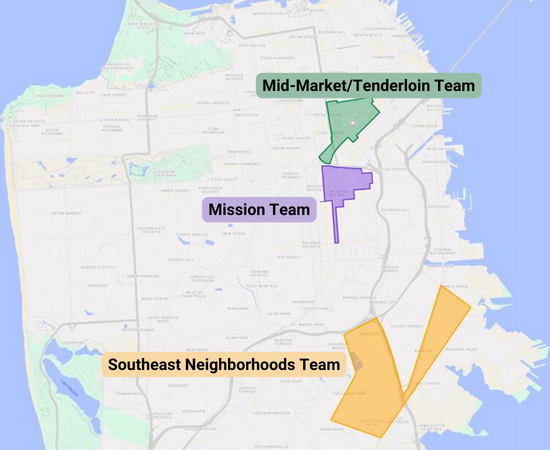DATA STORY
Community Ambassadors Program data
Community Ambassadors Program year to date service data
Office of Civic Engagement and Immigrant AffairsAbout the Community Ambassadors Program
The Community Ambassadors Program (CAP) is a community safety and neighborhood engagement program. We engage, inform and assist community members in San Francisco. CAP also provides a visible, non-law enforcement safety presence in several neighborhoods. This helps us build trust, calm tensions, and prevent violence.
The Community Ambassadors Program will conclude at the end of 2027.
We have ended coverage in the Sunset, District 5, and Chinatown neighborhoods, and currently remain active in the Mission, Bayview/Visitacion Valley/Portola, and Mid-Market/Tenderloin neighborhoods.
As we plan for the program’s conclusion, our focus remains on supporting residents, connecting people to resources, and working alongside community partners. If you have questions or would like more information, please reach us at civic.engagement@sfgov.org.

CAP teams and work areas
The Community Ambassadors Program has teams that work in the following neighborhoods:
- Mid-Market/Tenderloin
- Mission
- Southeast neighborhoods, including: Bayview/Visitacion Valley/Portola
The map below shows the current CAP work areas.

About the data
Community Ambassadors conduct a wide variety of services. Whether it's helping with directions, or connecting someone to a shelter, Ambassadors track every service they provide.
The following data dashboards highlight the services provided by the Community Ambassadors Program, by the these categories:
- Crisis response and intervention: overdose response, interventions/de-escalations, and calls to 911.
- Safety and wellness: reports to 311, safety escorts, and wellness checks.
- Neighborhood support: directions and wayfinding, merchant visits, and service referrals.
All data is self-reported by Community Ambassadors on a daily basis and dashboards are updated monthly. To learn more about each service type, read the "data notes" below the "Field Services" dashboard.
Total CAP Interactions
Navigating dashboards with a keyboard
- Control + Enter to enter the dashboard
- Tab or Arrow to move between visuals
- Control + Right arrow to enter a visual or filter
- Escape to exit a visual, filter or dashboard
Navigating within a visual or filter
- Tab or Arrow to move around a table or visual
- Enter to select within a table or visual
- Spacebar to select or deselect a filter
CAP Field Services
Navigating dashboards with a keyboard
- Control + Enter to enter the dashboard
- Tab or Arrow to move between visuals
- Control + Right arrow to enter a visual or filter
- Escape to exit a visual, filter or dashboard
Navigating within a visual or filter
- Tab or Arrow to move around a table or visual
- Enter to select within a table or visual
- Spacebar to select or deselect a filter
Data notes and sources
Key Terms
- Community Ambassadors provide an Overdose Response when there is a probable opioid overdose. Ambassadors are trained to use naloxone nasal spray, also known as NARCAN, to reverse the effect of an opioid overdose. Note: when a "0" (zero) appears on the Overdose Response dashboard, this means no response happened that month.
- De-escalations occur when Community Ambassadors respond to situations that need immediate intervention. Help may be requested by a merchant or other person in the neighborhood where Ambassadors work. Depending on the severity of the situation, Ambassadors work together to de-escalate, or call in an emergency response.
- Community Ambassadors make Emergency Calls to 911, when needed. Ambassadors call 911 in crisis situations, providing necessary details to the 911 operator.
- Community Ambassadors support street cleanliness with Reports to 311. They respond to street conditions like: hazards, human waste, graffiti on public property, clogged street drains, needle pick up, and more. Ambassadors also report discarded hypodermic needles to the San Francisco AIDS Foundation (SFAF).
- Safety Escorts are a safe passage for anyone in the neighborhoods with Ambassadors. Ambassadors walk with people to get them where they are going. Safety escorts can be requested in advance by calling 311.
- Community Ambassadors provide Wellness Checks to assess someone's current wellbeing. Ambassadors check on people who are sleeping on sidewalks. They offer service referrals to people when relevant.
- Community Ambassadors support residents and visitors with Directions/Wayfinding. They help with directions, safety escorts, or help navigating public transit.
- Merchant Visits involve a check-in with neighborhood businesses and storefronts. Ambassadors engage with merchants' concerns or requests. They also provide merchants with outreach materials or relevant information.
- Community Ambassadors provide Service Referrals to people. This may include a referral to a shelter bed or to an immigration legal service, and more.
Learn more
The Community Ambassadors Program (CAP) is a community safety and neighborhood engagement program.
Learn more about who we are, what we do, and where we work.
For questions about the data or to make a request for our monthly reports, email community.ambassadors@sfgov.org
